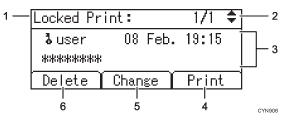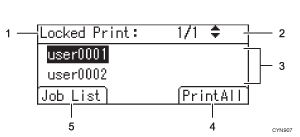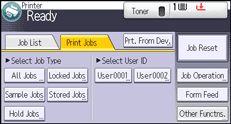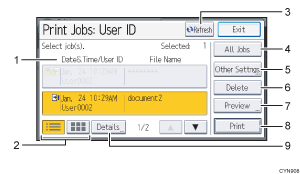This section explains the functions of the print job screen.
![]()
When the optional hard disk is installed, the following initial screen appears at power on.

If you press [Prt.Jobs] on the initial screen, a screen prompting you to select the type of print job appears.

After selecting a type, you can select print files in the list by pressing:
[Job List]
Displays the Job List screen.
[User ID]
Displays the User ID screen.
Job List Screen

The type of print jobs
Displays the type of print job that you selected.
Page number
Displays the current page number. Press the [
 ] or [
] or [ ] key to display the next or previous page.
] key to display the next or previous page.User ID, Date/Time, and File Name display
User ID shows the user's ID set by the printer driver.
Date and Time show the time at which the print job was stored in the printer.
File name shows the name of the file. However, "****" is shown instead of the file name for a Locked Print file.
[Print]
Prints a selected file.
[Change]
Changes or clears the password of a file if a password is set. To change the password of a Locked/Stored Print job, press [Change], enter the current password, and then enter the new password on the confirmation screen. To clear the password for the Stored Print Job, press [Change], enter the current password, and then press the [OK] key in the confirmation screen without entering anything in the new password box.
You can also set passwords to the Stored Print files that do not currently have passwords.
[Delete]
Deletes a selected file.
![]()
You can use [Change] to set or clear passwords only when Stored Print files are stored in the printer.
User ID Screen

The type of print jobs
Displays the type of print job that you select.
Page number
Displays the current page number. Press the [
 ] or [
] or [ ] key to display the next or previous page.
] key to display the next or previous page.User ID
User ID shows the ID of the user who stored the selected type of files.
User ID set by the printer driver is shown.
[PrintAll]
Prints all files stored by the user whose user ID has been selected.
[Job List]
Switches the screen to the [Job List] screen.
Displays the print jobs of the selected user only.
![]()
The screen is not updated if a new file is stored while the list of stored files is displayed. To update the display, press the [Menu] or [Escape] key to return to the initial screen, and then press [Prt.Jobs] again.
If a large number of print jobs are stored in the printer, processing may slow temporarily, depending on which functions are used.
![]()
Press the [Printer] icon on the [Home] screen, and then press the [Print Jobs] tab. The screen to select a type of print job and User ID appears.

Press a type of print job or User ID to display the list of print jobs.

Date&Time, User ID, and File Name display
Date and Time displays the time at which the print job was stored in the printer.
User ID displays the user's ID set by the printer driver.
File Name displays the name of the file. However, "****" is shown instead of the file name for a Locked Print file.
List/Thumbnail
Switches between list view and thumbnail view.
[Refresh]
Updates the contents of the screen.
[All Jobs]
Selects all jobs of the same type.
[Other Settings]
Use this to change the preset print time for a Hold Print job or the password to a Locked/Stored Print job.
[Delete]
Deletes the selected job.
[Preview]
Previews the first page of the selected job.
[Print]
Prints the selected job.
[Details]
Displays the detailed information of the selected job.
![]()
If a large number of print jobs are stored in the printer, processing may slow temporarily,
depending on which functions are used.
